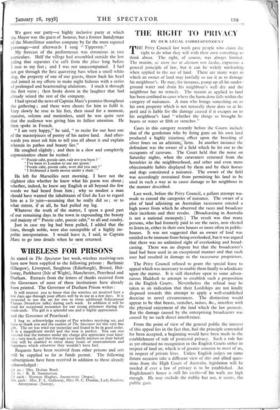THE RIGHT TO PRIVACY
BY OUR LEGAL CORRESPONDENT
Cases in this category recently before the Courts include that of the gentleman who by firing guns on his own land produced a highly injurious effect upon the breeding of silver foxes on an adjoining farm. In another instance the defendant was the owner of a field which he let out to the occupants of caravans. The Court held that the noise on Saturday nights, when the caravaners returned from the hostelries in the neighbourhood, and other and even more objectionable habits displayed by them and by their horses and dogs constituted a nuisance. The owner of the field was accordingly restrained from permitting his land to be used in such a way as to cause damage to his neighbour in the manner described.
Last week, before the Privy Council, a gallant attempt was made to extend the categories of nuisance. The owner of a plot of land adjoining an Australian racecourse erected a high tower from which he observed the races and broadcast their incidents and their results. (Broadcasting in Australia is not a national monopoly.) The result was that many persons, who had formerly paid to see the races, now elected to listen in, either in their own houses or more often in public- houses. It was not suggested that an owner of land was entitled to be immune from being overlooked, but it was argued that there was no unlimited right of overlooking and broad- casting. There was no dispute but that the broadcaster's land had been used in an exceptional manner and that such user had resulted in damage to the racecourse proprietors.
The Privy Council refused to grant the special leave to appeal which was necessary to enable them finally to adjudicate upon the matter. It is still therefore open to some adven- turous Haddock to attempt to establish such a proposition in the English Courts. Nevertheless the refusal may be taken as an indication that their Lordships are not kindly disposed towards this attempt to apply a well-established doctrine to novel circumstances. The distinction would appear to be that beasts, stenches, noises, &c., interfere with the physical enjoyment of the land which the law protects. But the damage caused by the enterprising broadcaster was caused by no such direct interference.
From the point of view of the general public the interest of this appeal lies in the fact that, had the principle contended for been accepted, a beginning would have been made in the establishment of rule of protected privacy. Such a rule has as yet obtained no recognition in the English Courts either in respect of land or, which is of greater concern to most of us, in respect of private lives. Unless English judges on some future occasion take a different view of this and allied ques- tions from the High Court of Australia, legislation will be needed if ever a law of privacy is to be established. An Englishman's house is still his castle—if his walls are high enough. He may exclude the public but not, it seems, the public gaze.


















































 Previous page
Previous page